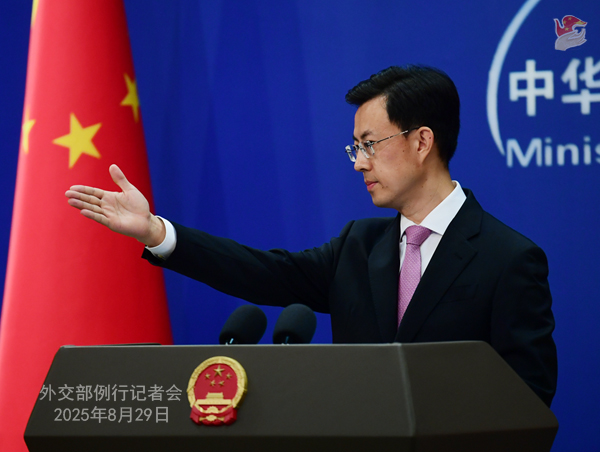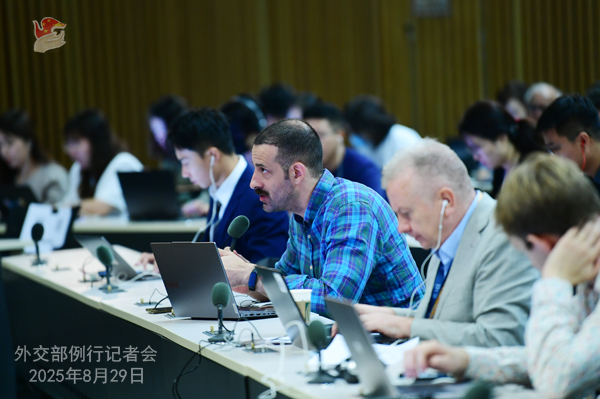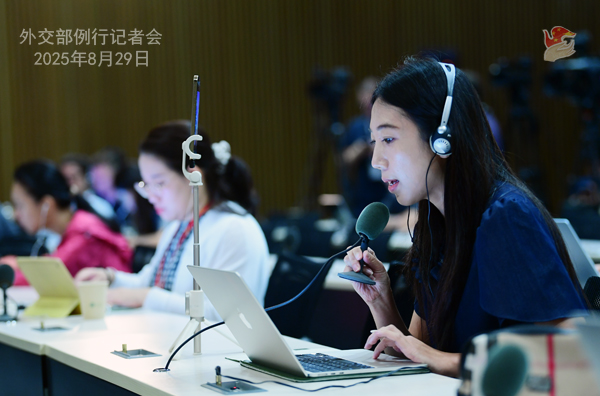
People’s Republic of China


CCTV: As the SCO Tianjin Summit is about to be held, we noted that the Xi Jinping Thought on Diplomacy Studies Centre held a book launch event for Stories of the SCO in the New Era last week, inviting the public to share their own experience of participating in SCO cooperation. What is your comment?
Guo Jiakun: SCO cooperation in various fields has flourished in the new era with many touching stories. Centering on building an SCO community with a shared future and on the development of the SCO as was proposed by President Xi Jinping, the book Stories of the SCO in the New Era included 18 vivid stories of SCO countries engaging in mutually beneficial cooperation and benefiting the people in areas of science and technology, people’s wellbeing, environmental protection, and cultural and people-to-people exchange. It is a vivid illustration of the vision of building an SCO community with a shared future, and will help build a closer bond between the people in the big family of the SCO.
We believe that with the concerted effort of all parties, the upcoming SCO Tianjin Summit will become a summit of friendship, solidarity and fruitful outcomes, and the SCO will enter a new stage of high-quality development featuring greater solidarity, coordination, dynamism and productiveness, and contribute more solutions and strength to building a community with a shared future for humanity.
Spanish Daily ABC: Spain’s Center for National Intelligence, together with other international agencies, has participated in a cybersecurity advisory issued this Wednesday. This advisory states that China’s state-sponsored actors are targeting networks globally to access sensitive data and critical infrastructure at least since 2021 and even mentioned three specific entities. What is China’s response to these accusations?
Guo Jiakun: China always opposes and fights hacking activities in accordance with the law. And China firmly opposes spreading disinformation out of political agenda. China strongly deplores and firmly opposes the U.S. bringing certain countries along to smear and vilify China under the pretext of cybersecurity.
As is known by all, the “PRISM” program disclosed by Edward Snowden has shown that the U.S. has been proven to be the world’s largest “hacking empire” and “eavesdropping empire.” Even the countries, the U.S.’s so-called allies, that participated in the farce this time, were once victims of its eavesdropping and surveillance. Yet now the U.S. is attempting to falsely accuse China of “cyber espionage.” This is typical hypocrisy of claiming itself to be the victim while it’s the other way around.
According to reports of a Chinese cybersecurity institution, the so-called “Volt Typhoon” once hyped up by the U.S. was actually a transnational ransomware group. It was a joint move of vilification and framing against China by U.S. intelligence agencies and cybersecurity companies in order to receive more congressional budgets.
Let me point out that according to U.S. media outlets, this incident so happened because the “backdoor”, originally opened by the U.S. intelligence service to eavesdrop on its own institutions and citizens, was used by hackers. Such “backdoor” in the U.S.’s own telecommunication system is not only a “U.S. feature”, but also the “best practices” of “Five Eyes.” Who is engaged in massive cyber-eavesdropping? Who is the largest hacking empire? The international community knows full well the answer.
Cybersecurity is a global common challenge. China urges the U.S. to take a responsible attitude, and reflect more on what it’s doing instead of forming small groupings to smear others. China will continue to take necessary measures to safeguard its own security interests.
Spanish Daily ABC: In a specific case of Spain, this comes at a particular time because that mentioned cybersecurity advisory happens at the same time the Spanish government is facing pressure from the U.S. for choosing Huawei as a provider for its traditional network. I would like to ask what is China’s response to that specific case and whether China can guarantee the safety of Huawei’s digital infrastructure.
Guo Jiakun: I am not familiar with the specific project you mentioned. Let me point out that Chinese businesses have not only provided quality products and services to people of all countries across the world, but also contributed to local economic and social development as well as employment, and this is widely welcomed by various countries. Politicizing trade issues will only disrupt normal technological exchange and cooperation and does not serve any party’s interests.

Reuters: Can you please tell us whether foreign troops will also march in next Wednesday’s military parade? With Russia and North Korea’s heads of state in attendance, can we expect to see soldiers from those two particular countries? Can you tell us whether any Taiwanese veterans or politicians will be attending?
Guo Jiakun: We welcome Russian President Vladimir Putin and DPRK Supreme Leader Kim Jong-un to China for events marking the 80th anniversary of the victory of the Chinese People’s War of Resistance Against Japanese Aggression and the World Anti-Fascist War. For your specific question, I’d refer you to competent authorities.
Xinhua News Agency: The seventh China-Arab States Expo opened in Yinchuan, Ningxia yesterday. Close to 10,000 people from 75 countries and regions took part in the expo, and the UAE attended as the Guest Country of Honor. What is your comment?
Guo Jiakun: Since the launch in 2013, the China-Arab States Expo has been an important platform for Belt and Road cooperation between China and Arab states. We’ve learned that themed “Innovation, Green Development and Prosperity”, this expo focuses on digital economy, clean energy, artificial intelligence, modern agriculture, water resources, smart meteorology and other trending topics, and is expected to reach a good number of results. This says a lot about the vigorous trade cooperation between China and Arab states. The expo will feature the council meeting of the China-Arab Countries Inter-Bank Association, the Silk Road E-Commerce innovation and development conference, and other events on meteorology, standardization and intellectual property, the first of their kind in the expo’s history, which will give a fresh boost to cooperation between China and Arab states.
Next year, the second China-Arab States Summit will be hosted in China. China stands ready to work with Arab states to carry forward the spirit of China-Arab friendship, carry out “eight major cooperation initiatives” for our practical cooperation and “five cooperation frameworks”, write a new chapter for our common development, and promote the building of a China-Arab community with a shared future.
Global Times: It’s reported that during the joint drills in Japan in September, the U.S. military plans to deploy the Typhon medium-range missile system in Japan and conduct relevant exercises. The system will be removed after the drills. What is China’s comment?
Guo Jiakun: We noted relevant reports. China has repeatedly expressed grave concerns on relevant issues. China always opposes the U.S. deploying the Typhon Mid-Range Capability missile system in Asian countries. The deployment of the Typhon MRC missile system in Japan will further undermine the legitimate security interests of other countries and pose a substantive threat to regional strategic security. The U.S. and Japan should respect other countries’ security concerns, refrain from the deployment of Typhon, and contribute to regional peace and stability with concrete actions.
Owing to its history of militarist aggression, Japan’s military and security moves have been closely watched by its Asian neighbors and the international community. This year marks the 80th anniversary of the victory of the Chinese People’s War of Resistance Against Japanese Aggression and the World Anti-fascist War. We urge Japan to take a hard look at its history of aggression, follow the path of peaceful development, act prudently in military and security areas, and refrain from further losing the trust of its Asian neighbors and the international community. We also call upon the U.S. to draw lessons from history and devote more effort and resources to doing the right thing rather than the other way around.
Reuters: U.S. Senator Roger Wicker, Chair of the Senate Armed Services Committee, has arrived in Taipei. Does the Foreign Ministry have any comment?
Guo Jiakun: China firmly opposes any form of official interactions between the U.S. and China’s Taiwan region. The visit by the U.S. Congress member seriously violated the one-China principle and the three China-U.S. joint communiqués, harmed China’s sovereignty and territorial integrity, and sent a seriously wrong message to “Taiwan independence” separatist forces. China strongly deplores this.
There is but one China in the world, and Taiwan is an inalienable part of China’s territory. China asks the U.S. to abide by the one-China principle and the three China-U.S. joint communiqués, stop interfering in China’s internal affairs and abetting and supporting “Taiwan independence” separatist forces under any pretext, stop official interactions with China’s Taiwan region, and stop creating tensions for the situation across the Taiwan Strait.
Bloomberg: A tanker with a shipment of liquefied natural gas from a Russian facility that’s been sanctioned by the U.S. appears to have discharged its cargo at a Chinese terminal today. The tanker’s called Arctic Mulan. Can the Foreign Ministry confirm that China has imported the cargo, and is China concerned about possible repercussions from the U.S. as a result of importing the cargo?
Guo Jiakun: I am not familiar with what you mentioned.
O Globo: I understand there was a phone call between the Chinese Foreign Minister and the Brazilian Foreign Minister. My question is, is there talk about a coordinated response between China, Brazil, and possibly India against U.S. trade measures?
Guo Jiakun: On the phone call between the Chinese and Brazilian foreign ministers, China has released a readout. China’s position on tariffs is consistent and clear.

China News Service: It’s reported that on August 28, the UK, France and Germany notified the UN Security Council that the “snapback” mechanism will be initiated. According to UNSC Resolution 2231, the Security Council will decide whether to initiate the snapback process in 30 days. What is China’s comment?
Guo Jiakun: The Iranian nuclear issue is at a crucial crossroads. Initiating the snapback process at the Security Council is not a constructive move, which will disrupt the settlement of the Iranian nuclear issue through political and diplomatic means.
China believes that current moves by the Security Council should contribute to resuming dialogue and negotiation rather than create new confrontation and lead to deterioration or even escalation of the situation.
China will continue to uphold an objective and fair position, actively promote talks, and play a constructive role in bringing the issue back to the track of diplomatic settlement as early as possible.
NHK: A British aircraft carrier made a port call at Tokyo yesterday. It had participated in joint drills with Japan and other countries in the West Pacific. The UK said the port call aims to demonstrate its involvement and input in the security and prosperity of the Indo-Pacific region. What’s China’s comment?
Guo Jiakun: The Asia-Pacific is a pacesetter of cooperation and development, not a chessboard for geopolitical competition. Peaceful development, cooperation and mutual benefit are what people in the region want. We hope relevant countries will work with regional countries to contribute more to enhancing mutual trust and cooperation, and promoting peace and stability.
PTI: Some reports say that among all those leaders to take part in the Shanghai Cooperation Organization, the Indian Prime Minister will not take part in the September 3 victory parade. Can you please clarify it?
Guo Jiakun: China shared information on foreign leaders’ attendance at the events commemorating the 80th anniversary of the victory of the Chinese People’s War of Resistance Against Japanese Aggression and the World Anti-Fascist War. You may refer to that.
Bloomberg: Japanese media Nikkei is saying that U.S. Defense Secretary Pete Hegseth is seeking a phone call with his Chinese counterpart, but there has been no definitive answer from the Chinese side. If such a call were to take place, it would be the first military-to-military senior engagement between the U.S. and China since the current Trump administration came into office. Can the Foreign Ministry comment on the defense secretary’s claims that the Chinese side is not giving a definitive answer about a possible meeting or call?
Guo Jiakun: I’d refer you to competent authorities for your specific question.
AFP: A question on Russia and Ukraine. Russian strikes on the Ukrainian capital Kyiv killed over 20 people so far. Does China condemn this new attack?
Guo Jiakun: On the Ukraine crisis, China always believes that dialogue and negotiation is the only viable way out of the crisis. We call on relevant parties to follow the principles of no expansion of the battlefield, no escalation of fighting and no provocation by any party, facilitate the deescalation of the situation, and accumulate conditions for the political settlement of the crisis.
Bloomberg: Foreign Ministry Spokesman, your colleague, said last year that China doesn’t import soybeans from Paraguay and that the soybean level was zero. My question is has anything changed in China’s stance on agricultural products from Paraguay? And are soybeans currently allowed into China from Paraguay?
Guo Jiakun: I have no information to offer on the specifics you mentioned. I’d refer you to competent authorities.
EFE: According to the Spanish newspaper El Pais, the Spanish government canceled a contract that deals with Huawei equipment that sought to enhance fiber optic services for various public institutions, including the Ministry of Defense. Do you have any comment?
Guo Jiakun: I answered this question just now. Let me reiterate that Chinese businesses have not only provided quality products and services to people of all countries across the world, but also contributed to local economic and social development as well as employment, and this is widely welcomed by various countries. Politicizing trade issues will only disrupt normal technological exchange and cooperation and does not serve any party’s interests.
AFP: The Chinese trade negotiator and Vice Commerce Minister Li Chenggang is traveling to Washington this week. Can you update us on his schedule? Which U.S. officials will he meet and when?
Guo Jiakun: Yesterday, the spokesperson of the Ministry of Commerce shared relevant information on that. For further questions, I’d refer you to competent authorities.



